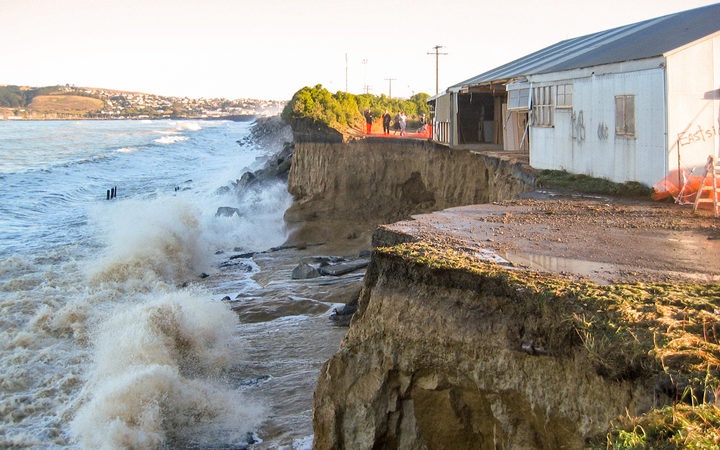Kate Gudsell, Environment Reporter
The burden of sea-level rise will weigh on the most vulnerable unless a new approach is developed and legislated, a new report says.

In June 2007, the coastal cliffs at Oamaru lost a lot of ground, including a conservation area for blue penguins and the factory seen here. Photo: Murray Hicks.
The paper, written by University of Otago Associate Professor Lisa Ellis, is part of research from the Deep South National Science Challenge. It looks at how New Zealand distributes the risks of sea-level rise.
It proposes an "ethically robust" policy to adapt to the risks of climate change.
Tens of thousands of buildings, infrastructure including airports, railways, and roads, and more than 100,000 residents are at risk of serious loss and damage associated with sea-level rise within the next century.
Prof Ellis said sea-level rise was entirely predictable but if New Zealand was proactive about adaptation to climate change, peoples' wellbeing would not be threatened.
But she said it was possible existing inequality would be exacerbated and the cost of adapting to climate change would rise if the status quo remained.
Her report recommended a government resource about adapting to sea-level rise nationwide, so community resilience did not vary with ratepayers' ability to pay.
At local level the public should be engaged as early and deeply as possible.
Last year, the Ministry for the Environment released guidelines on adaptation for local government.
Prof Ellis said while they were a step in the right direction, they were just guidelines.
Her report recommended that government ensured cross-regional equality, so communities did not feel unduly punished by proactive councils.
An example of this was if communities chose to build sea walls for protection, there was a risk that beaches ended up getting lost to the engineered protection works.
The report laid out the need to pre-fund adaptation measures on a national level because it would overcome inter-generational inequality in the future.
"It's going to be very difficult for them to have any kind of wellbeing comparable to ours if we don't pre-fund adaptation," Prof Ellis said.
It would also overcome inequality among exposed regions, because the ability to respond to sea-level rise depended on rate-payer capacity, which varied across New Zealand.
Prof Ellis said it was vital young people were engaged early as they had the greatest stake in the future.
"It would be a monstrous violation of our duty to them, to exclude them from these decisions, when in fact the decisions will meet them much more than it will meet us."
She said often community consultation meetings were held during the day, tended to amplify the voices of people who were old and disproportionately wealthy, and young, disadvantaged people needed representation.



 Binoy Kampmark: Stifling The Sikh Diaspora - India’s Continuing War On Khalistan
Binoy Kampmark: Stifling The Sikh Diaspora - India’s Continuing War On Khalistan Gordon Campbell: On The Language Of Healthcare, And Mink DeVille
Gordon Campbell: On The Language Of Healthcare, And Mink DeVille David Cooke: Languages In Hospital
David Cooke: Languages In Hospital Binoy Kampmark: Weak Endeavours - The Meekness Of Australia’s Anti-Corruption Body
Binoy Kampmark: Weak Endeavours - The Meekness Of Australia’s Anti-Corruption Body Binoy Kampmark: Widening The War - The US Sends Troops To Israel
Binoy Kampmark: Widening The War - The US Sends Troops To Israel Martin LeFevre - Meditations: Beethoven’s 7th And Conducting Beauty Beyond The Mind Of Man
Martin LeFevre - Meditations: Beethoven’s 7th And Conducting Beauty Beyond The Mind Of Man